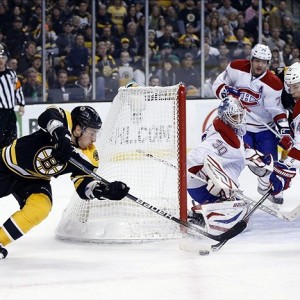The Boston Bruins began the year in camp devising a new defensive breakout. They made headlines for making a stride in a new direction. Coach Claude Julien contrived a system of implementing a fourth attacking off the defensive zone rush with a D-man joining in with the forwards. Yet after nearly 20 games into the 2015-16 season, it’s not the breakouts making noise for Boston. It’s the power play, of all things.
Julien has witnessed an evolution in his team’s abilities on the man advantage. Historically, Julien’s special teams have lacked production. From his first full season as head coach in Boston during the 2007-08 season until the 2012-13 season, the Bruins’ power-play percentage was consistently less than 20%. That’s not the case this season thus far.
Indeed, the Bruins currently attain the No. 1 power play in the NHL with a power-play percentage of 32.3. Boston’s No. 1 power-play unit of Ryan Spooner – Patrice Bergeron – Loui Eriksson, with David Krejci flanking Torey Krug on the blue line, have taken it to their opponents. With Krejci overseeing the playing field from the blue line, he orchestrates the man advantage when Bergeron wins the faceoff. From there, Krug and Krejci typically exchange passes, surveying their options. Spooner takes directly to his prototypical position along the boards outside the face-off circle.
Once the puck is on Spooner’s stick, he’s looking for a stick or a body upfront crashing the net. Either he’ll throw a puck on net or he’ll dish the puck off to the blue line. Krejci may slide down from the blue line on the weak side anticipating a pass. The passing creates mismatches, space, and traffic for the goaltender.
Bergeron and Eriksson each have netted five goals on the power play. They roam the slot in anticipation for a pass, deflection, or rebound. Spooner, with two power play goals, works as the playmaker.
It’s a cerebral group, one that Julien has yet to have the luxury of coaching. It’s also a group that may not have reached their zenith.
Yet what can attribute to the lucrativeness of Boston’s power play? Here are three reasons why Boston’s power play continues to impress:
Ryan Spooner
Spooner’s influence on special teams is evident. Julien placed the 23-year-old on the top pairing for his quick skating and playmaking abilities. Spooner is an elusive, skilled forward who knows when to dish a puck off or to take a shot. He’s creating chances for his line mates by throwing pucks on net and making crisp passes. It’s the simplicity on the advantage that has eluded the Bruins for several years.
What’s even more reassuring for Boston is that Spooner will only continue to grow as an NHLer. In what is anticipated to be his first full season with the varsity squad, Spooner is already turning heads. He’ll gradually become a better skater and playmaker. His hockey I.Q. will develop with time and opportunity. Spooner’s game is perfect for the power play, an area in which he’ll become a mainstay for the Bruins along with Krug.
Second Unit Stepping Up

The second power play unit of Brad Marchand – Jimmy Hayes – Brett Connolly, with defensive unit of Zdeno Chara – Colin Miller, have also produced for Boston. It’s a group that has combined for seven power-play goals. When the first unit fails to make things happen, Julien can roll out his second unit with confidence they’ll have good looks.
Marchand’s shoot-first mentality translates to his special teams play. With Hayes in the mix, he brings a big body that bodes well for creating havoc in the crease when juicy rebounds develop. With Connolly beginning to find his game, more power play minutes will only be advantageous for the sniper. He’s finding space and having good looks, yet with only one power-play goal this season, the Bruins would like to see more goals from the winger on the advantage.
As for Chara and Miller, the tandem is in sync, which is all the Bruins coaching staff can ask for. Miller, a result of the Milan Lucic trade, came to Boston as a wildcard. At first, it was ambiguous if Miller would make the team. Yet after a strong preseason and consistent performances in the NHL, Miller has a bright future. Miller, in particular, is an active skater on the power play, a quality that is keeping him on the unit.
Simplicity
Just watching the Bruins work on the power play, you can see there’s nothing drastic about their scheme. They’ll attack you the same way on each man advantage. Julien doesn’t spice things up in between periods on the drawing board. Boston is simply making the most of their two minutes with skaters who belong on the power play.
It’s a mantra that can attribute to Boston’s offensive production from 5-on-5 to special teams. They’re not forcing plays. They’re thinking and playing strategically. The addition of Krejci on the blue line adds an extra element. Spooner is engulfed by veteran talent on his unit along with a power play mainstay in Krug. The Bruins will continue their success on the man advantage if they continue to throw pucks on net and make good decisions with the puck.